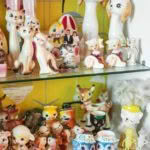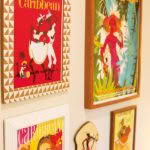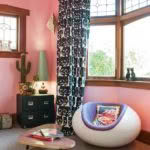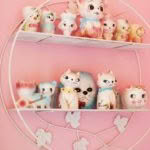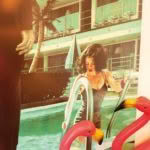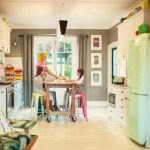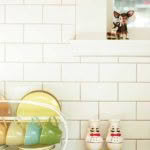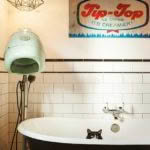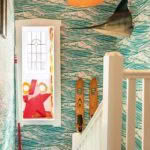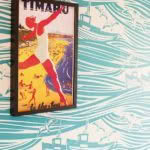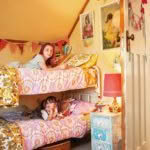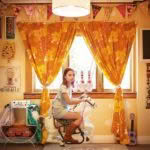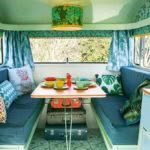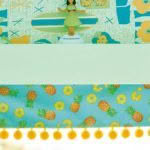A Timaru roller-derby dame’s slice of life is colourful, retro, and everything in-between
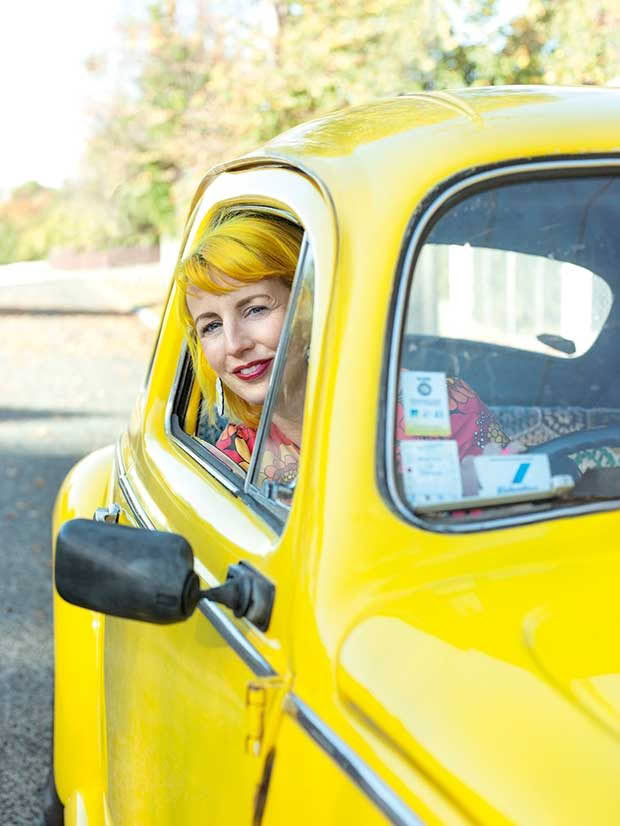
Her car, called Buttercup, is a money pit, but she can’t part with it. “I love the idea that it had a life before me.”
The bright side of life isn’t half bright enough for a roller-derby dame feeling her groove in Timaru.
Words: Emma Rawson Photos: Rachael McKenna
Rebecca Smith makes a vivid first impression.
Timaru locals might raise their eyebrows when they see her heels, long legs and mini-skirts disappearing through the driver’s window of her 1966 VW beetle but the Dukes of Hazzard-style entry is necessary when the door of the bug, named Buttercup, jams on hot days.
Patients at Timaru Hospital emergency ward are equally surprised at their first encounter with Rebecca; surely forgetting painful injuries for just a moment when greeted by the medical clerk, earrings made of syringes dangling beneath her yellow hair?
She describes her genre-bending style as a mix of Cyndi Lauper, Dolly Parton, Nancy Sinatra and Debbie Harry. Her dresses are vintage, her accessories punk, and her hair is “crazy”. (It’s been cherry, white, and tangerine in the past year.)
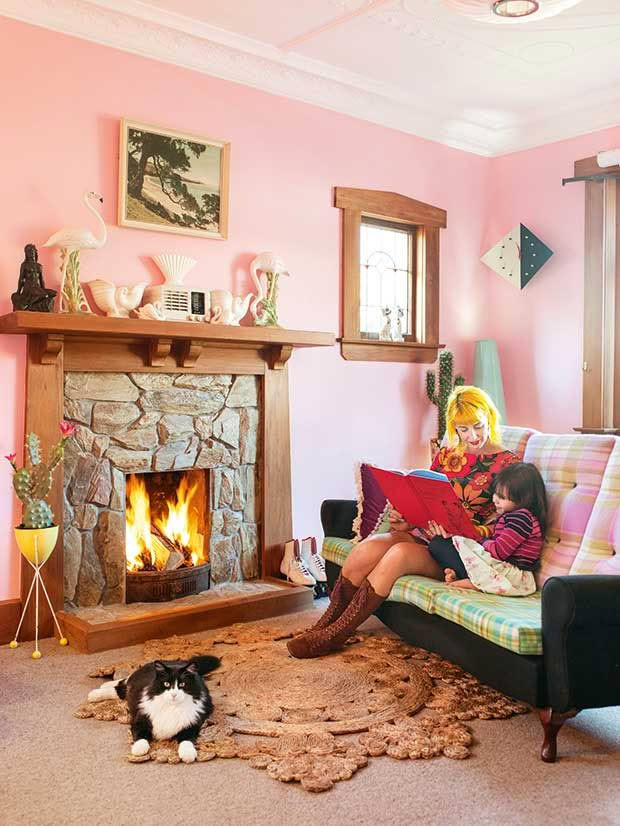
Rebecca’s possessions mainly come from op shops, auction houses and Trade Me, including an old edition of Paddington’s Treasury, a favourite of five-year-old Luka. The medical clerk is particularly fond of the flamingos on the mantelpiece, picked up in a Salvation Army store for $10 each.
In the evenings, she channels all that moxie into a kickass alter ego: roll over Miss Caroline Bay (Timaru’s iconic beauty pageant is still going strong), meet Miss Caroline Slay, Rebecca’s roller-derby persona.
In the 1950s and 1960s, Timaru’s Caroline Bay Carnival and its beauty pageant drew in the crowds. Now the spectators have moved up the hill to the Southern Trust Events Centre to watch Miss Slay and her team, the Derby Dames.
The all-female ensemble pride themselves on their strength and sass; the clue lies in their “punny” nicknames — DD Smash, Kim KarBASHian and Sting Rae. Bruises are called “derby kisses” and are badges of honour. Moves such as “apex jumps” and “hip checks” have the crowd cheering, and Rebecca’s two youngest daughters, Luka (5) and Nico (7), can often be heard yelling, “go Mummy” as she nudges her opponents out of the way.
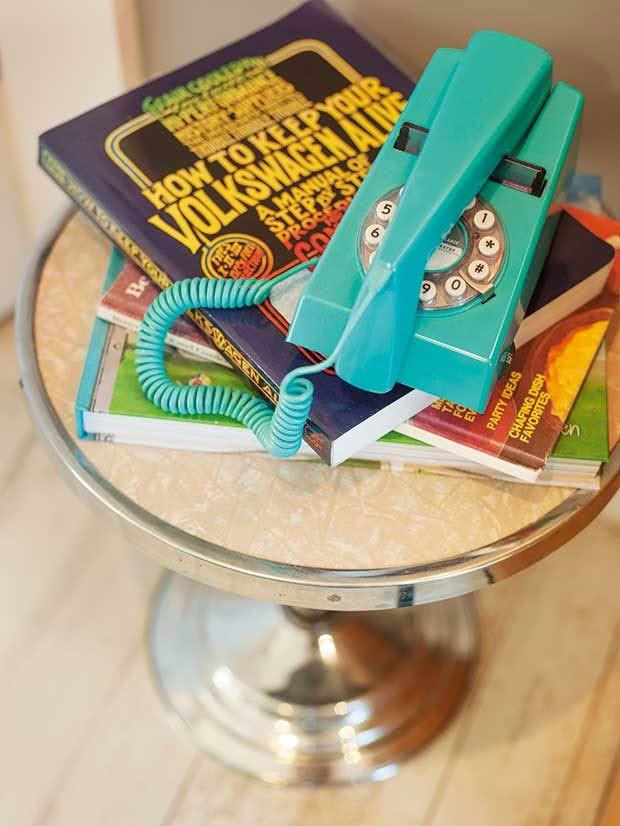
“I love that my kids can see their mother doing something different and being brave and strong,” says the mother of three whose eldest daughter, Astrea, is studying Japanese in Wellington.
“Nico and Luka are too little to follow the rules — actually, most adults don’t understand the rules, but there’s a family atmosphere, and there are a lot of other mums on the team.
“It’s an unusual sport but Timaru is behind us, and we have many supporters. You don’t get that same spirit in a big city.”
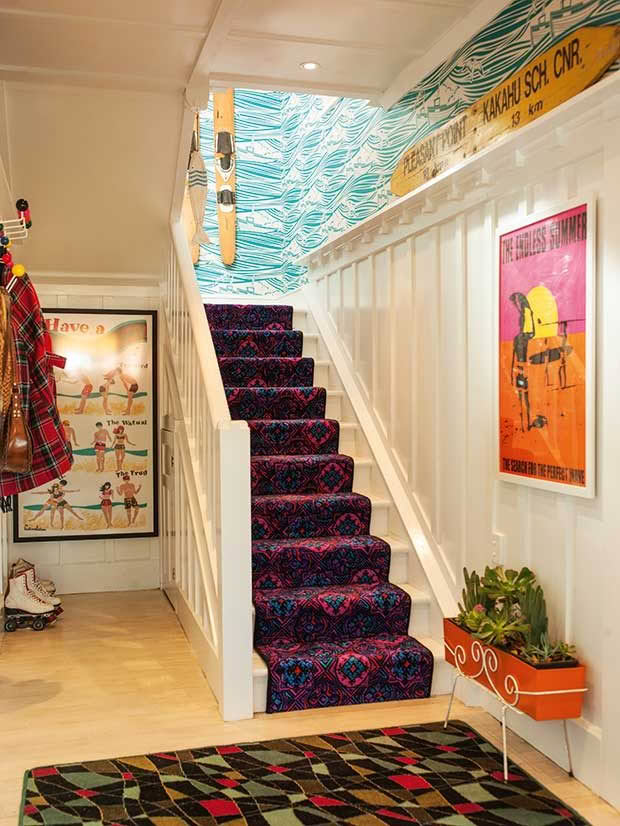
A 16-metre roll of unused carpet discovered in a second-hand shop found a new home on Rebecca’s stairs; the road sign (on the ledge) is from Serendipity Antiques & Collectables in Timaru and reminds her of family holidays at Pleasant Point.
Rebecca and her husband Kim moved to Timaru from Wellington five years ago, when Nico was a toddler. “Wellington is quite a transient city and one day we realized most of our friends had moved away. We were a bit worn down by city life, so we moved to Timaru. We didn’t know anyone, and we had no friends at first.”
Not to worry, Miss Caroline Slay is good at landing on her feet. Kim is a registered nurse and scored a job in the ER at Timaru Hospital. Rebecca, who has a sociology degree, wound up in the same workplace. Although she bought a pinstripe suit for her job interview, she never wore it.
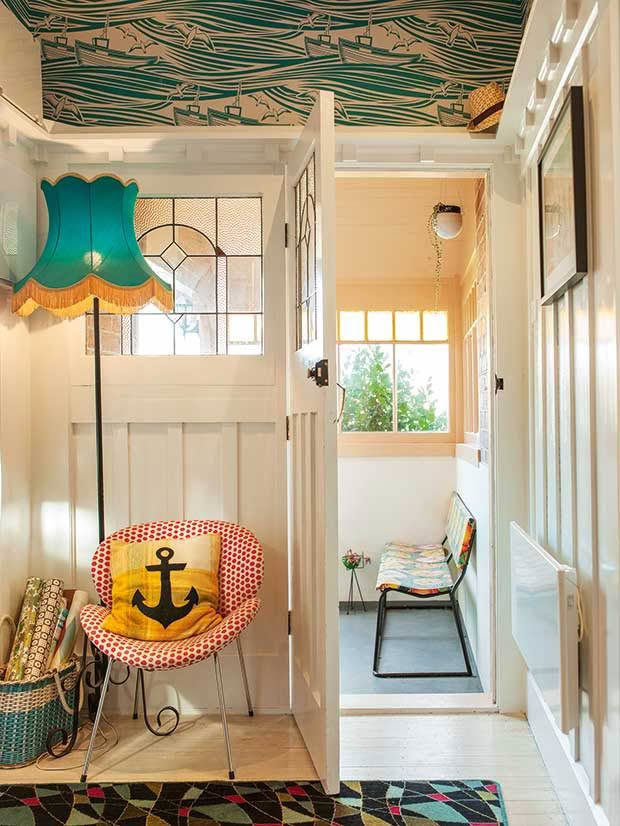
The standard lamp in the hallway came from a local recycling centre called the Crow’s Nest.
“I felt so self-conscious. I feel more myself when wearing colourful things.”
Timaru wasn’t entirely unfamiliar to Rebecca; her family had lived in the town until she was six. Her grandparents’ home in the suburb of Washdyke was decorated with kitsch delights such as velvet tapestries, Barsony lamps, and a fake coal fireplace. And Rebecca and Kim bought their home in Timaru’s Māori Hill (up the road from Caroline Bay), Rebecca channelled Nana’s retro style.
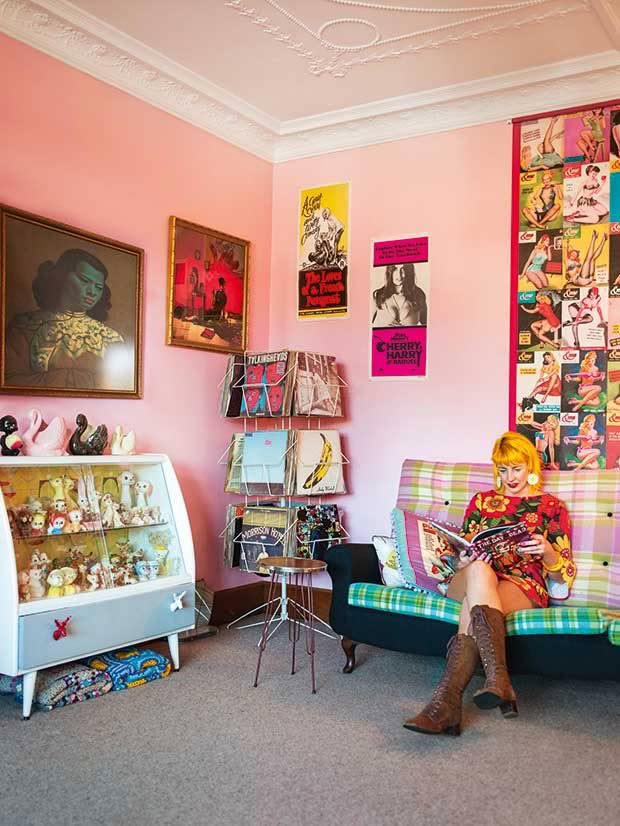
The couple initially chose the small, 120-square-metre 1930s-era house intending to do it up and sell it, as they planned to move to Australia after two years. (Astrea moved to Timaru briefly after high school but didn’t feel at home in the South Island and was eager to find her own feet in Wellington.)
The initial refurbishments in the kitchen were modest — white subway tiles with lashings of retro mint green — making the place bright but easy to sell. With Rebecca involved, however, it was never going to be a personality-free zone.
- Rebecca’s favourite pieces in this cabinet are the Miss Priss cat eggcups by Lefton, manufactured in Japan.
- Many of the vintage Caribbean travel posters were bought online; the extensive vinyl collection includes albums by Talking Heads, The Doors and Iggy Pop.
- The fibreglass 1960s Pastile chair design was made popular by Finnish interior designer Eero Aarnio.
- Cat ceramics were popular in the 1950s and 1960s. The two cats on the lower shelf looking towards each other are Cosy Kitties, made by mid-century giftware manufacturer Holt-Howard, and are coveted by collectors.
It wasn’t long before the bright kitchen received another lick of fun — a Deep South Ice Cream lightbox, an advertising sign that had once hung outside a dairy, makes the perfect feature light. Kim installed the $300 Trade Me find with no questions asked.
“Kim is so chill, and he doesn’t blink an eye when I ask him to do strange things such as hanging plastic fish plates or a fibreglass marlin on the wall. He doesn’t seem to mind his ‘out there’ house. Sometimes, I wonder if he even notices.”
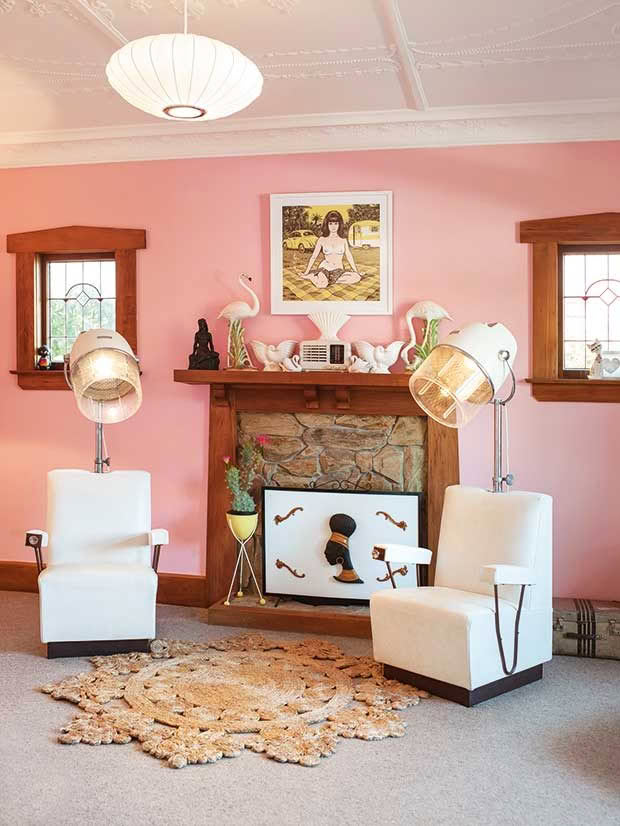
The seats in the lounge came from a hair salon in Dunedin, and Kim converted the dryers into standard lamps.
They side-lined plans to resell the house when they fell in love with Timaru, once known as the Riviera of the South. With a permanent home, Rebecca had a licence to go full-speed retro on the other rooms. While most people rip out old furnishings, Rebecca is putting the flower-power wallpaper back up and fitting psychedelic carpet to the stairs.
She bought a vintage hairdryer as a photo-booth prop for a roller-derby fundraiser. When she took it home after the event, the dryer, which reminds her of the film Hairspray, didn’t seem out of place on her own home, so she kept it.
- The collection of retro homewares includes vintage Pyrex and kitchen canisters made in the 1950s by the Australian plastics company, Gay, known as Gay “ware” ; the Deep South Ice Cream lightbox, once an brand sign, came from Nelson via Trade Me. Kim added the French doors, which are on their third life, used in two other Canterbury homes before making their way to Timaru.
- Crown Lynn tulip cups add colour to the comparatively restrained kitchen. The decorative deer (on the shelf above) were found in a “free” bin at an op shop.
- The retro hairdryer, picked up for $20, was a prop for a roller-derby fundraiser.
- Kim didn’t blink an eye when he was asked to hang the fibreglass marlin.
- The ships wallpaper was imported from Britain via the website Wallpaper Direct.
“Kitsch is a style that is so bad, it’s good. It’s tacky, but it’s tongue-in-cheek — a bit like a knowing wink at the camera in a movie. I like kitsch because it’s light-hearted and playful.
“At first, I bought pieces from op shops out of necessity when I was young and broke, but now I’m still drawn to pieces from the 1950s, 1960s and 1970s. They have always ‘spoken’ to me for their space-age optimism and nostalgic feel.”
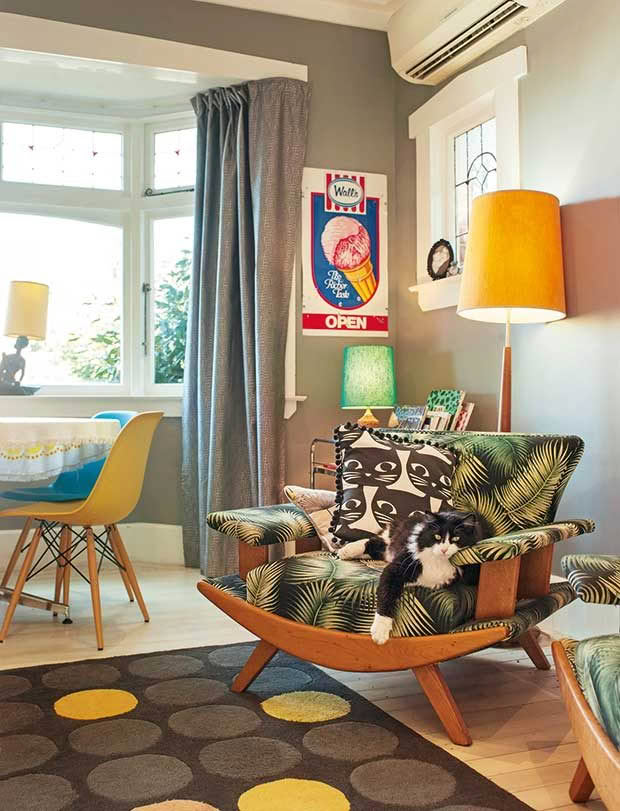
The armchairs in the dining area were originally a murky brown and were reupholstered with the palm design. Even Cookie, the cat, is second-hand — he was a stray that came to visit but never left.
Rebecca has always been a collector; as child stashing erasers, trolls and Baby-Sitters Club books. In her early teens, she moved onto collecting Bob Marley memorabilia, and after she left home, she honed her op-shopping skills while flatting in Palmerston North. Now, her current obsessions include Kewpie Dolls, vintage Pyrex and Japanese ceramic figurines.
“Once I have three items that are the same, I count it as a collection, and it grows from there. We live in a small house, and I don’t have much space. I’ve learned to be more disciplined about what I buy — but sometimes, I can’t resist.”
- Luka and Nico’s room includes a few retro delights such as the “sad, big-eyed children” prints by Dallas Simpson, a style made popular by Margaret Keane in the 1960s.
- The rocking horse reminds Rebecca of the merry-go-round at the Caroline Bay Carnival. Kim had to get inside the roof to hang it from the ceiling.
- The orange pendant light in the spare room came from the Oamaru Recycling Centre, and was initially marked as $5, but Rebecca bought it on sale for half that. The flower wallpaper is from the same store. There wasn’t quite enough to cover the whole room, so one wall has a different print.
Luka and Nico also have the collecting bug and have troves of toys. Luka likes Barbies, and Nico has an impressive stable of My Little Ponies. “They are becoming good at finding things — they have the eye.”
Right now, the family is on the scrounge for roller skates as Rebecca is planning a roller-disco for her 40th birthday later this year.
“Finding enough skates for everyone is going to be a challenge, but we’re good treasure hunters.”
CAMPING IT UP
Rebecca bought her 14-foot (4.3-metre) 1964 Zephyr caravan on Trade Me for $2000. The caravan was run down and had been used to accommodate wwoofers at a vineyard in Amberley. It was water-tight but rusty and needed new suspension.

Rebecca prefers her 1964 Zephyr caravan, which was pale blue and white, in its new colours.
The restoration involved months of work and required $12,000 in repairs and cosmetic touch-ups. These included a professional paint job on the outside, new wiring and lights, a new interior paint job (Rebecca and Kim’s handiwork), new tropical wallpaper (a custom design from the online store, Spoonflower) and retro curtains and cushions sewn by Rebecca.
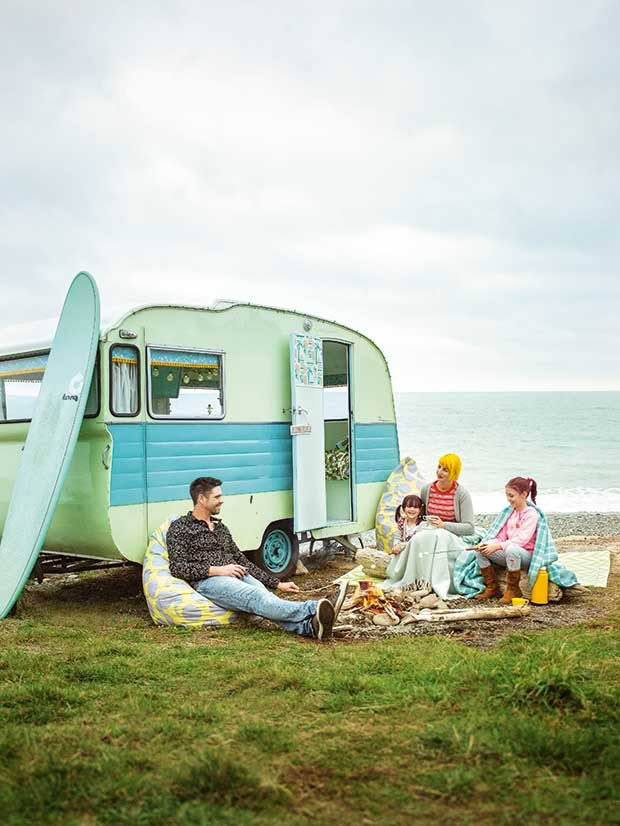
Kim and Rebecca first met playing canoe polo when they were teenagers. Kim was on the New Zealand team but no longer plays; he surfs when he gets the chance, however.
Kim rebuilt the table/bed, which originally only slept two, but now it’s well used by the whole family during the holidays. While doing up the caravan, Rebecca came across some receipts from the original owner.
When the restoration was complete, she tracked down the now-elderly former owner and towed the caravan to her house to show her its transformation.
- The wallpaper anchors the caravan’s colour scheme.
- The tiki/tropical wallpaper is from Spoonflower,
“She loved it, and then she told us stories about where her family used to travel in the caravan. It was so lovely to hear about its former life.”
ON A ROLL
Roller derby began in the United States in the 1920s. The modern version is a contact sport played with two teams of five players that skate around an oval rink. Points are scored when a designated player called the “jammer” laps the opposing team. The sport was first played in New Zealand in 2006, and there are now more than 40 all-women teams.
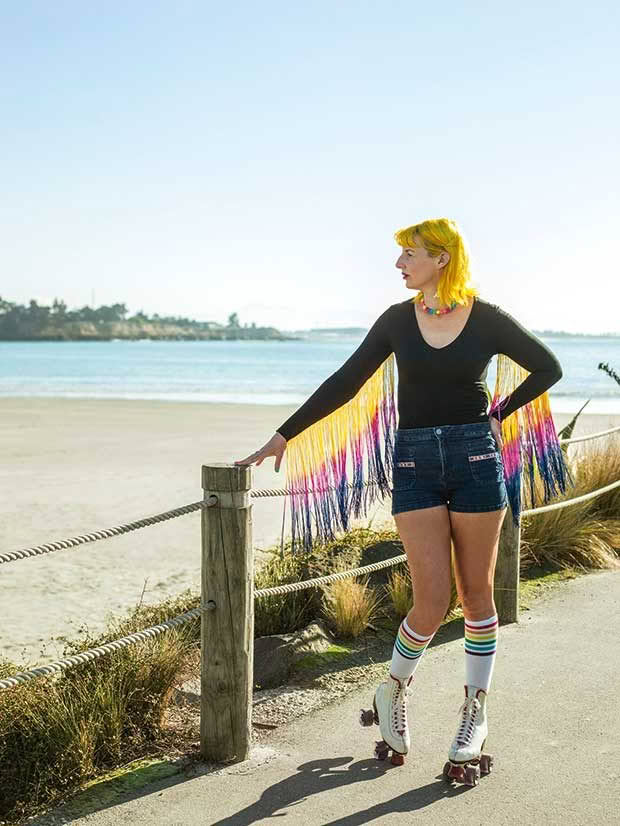
Skates used on the footpath differ to those used in roller derby, which is played indoors; the Timaru by the Sea sign (below right) is from the gift shop at the South Canterbury Museum.
Like pro-wrestling, the game involves an element of “camping it up”, although there’s no denying the athleticism involved, and the bumps and bruises are real. The sport often lacks players — any woman 18-plus can join a team but before they play a game (called a bout), they must reach a minimum skill level and must be able to skate backwards.
Follow the Timaru Derby Dames on Facebook here.
Love this story? Subscribe now!
 This article first appeared in NZ Life & Leisure Magazine.
This article first appeared in NZ Life & Leisure Magazine.
